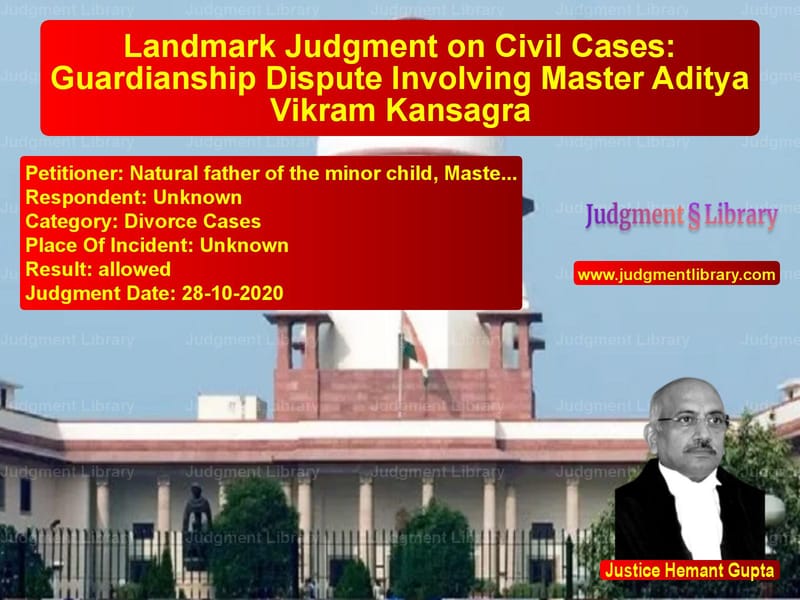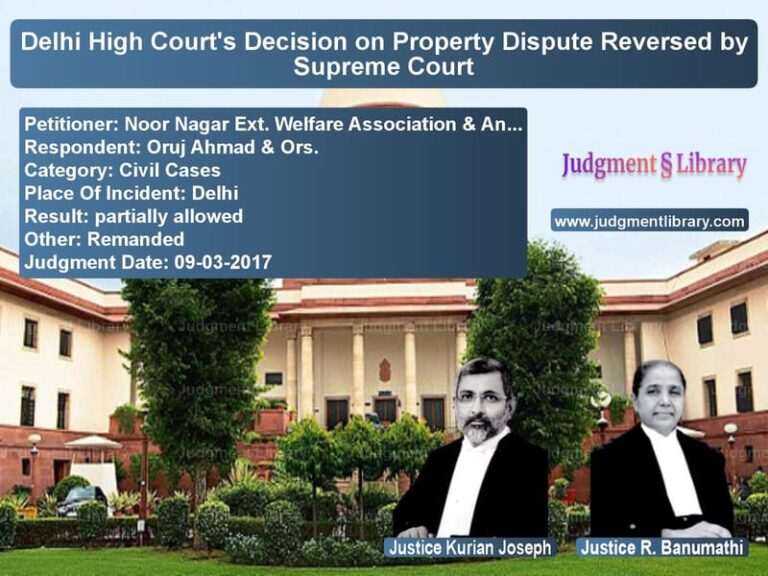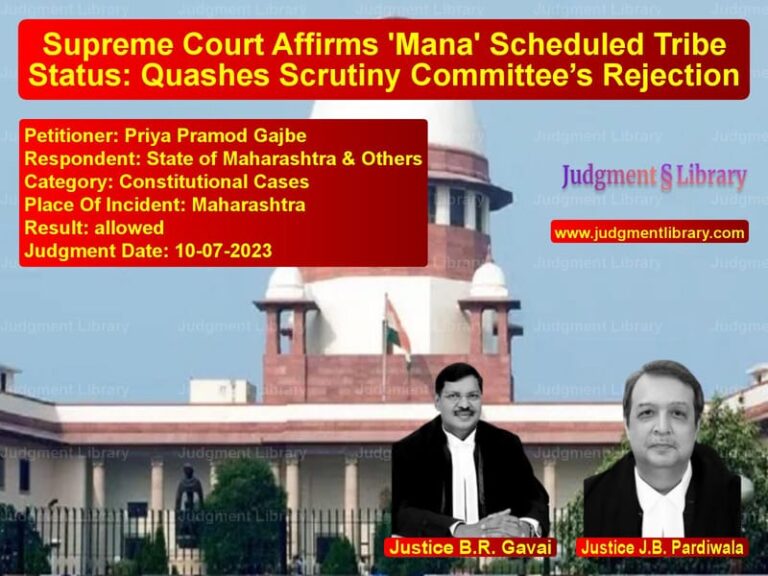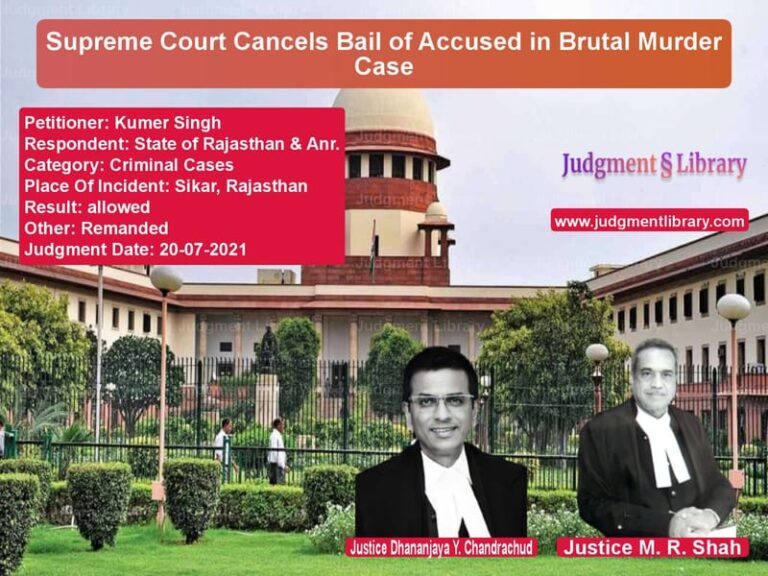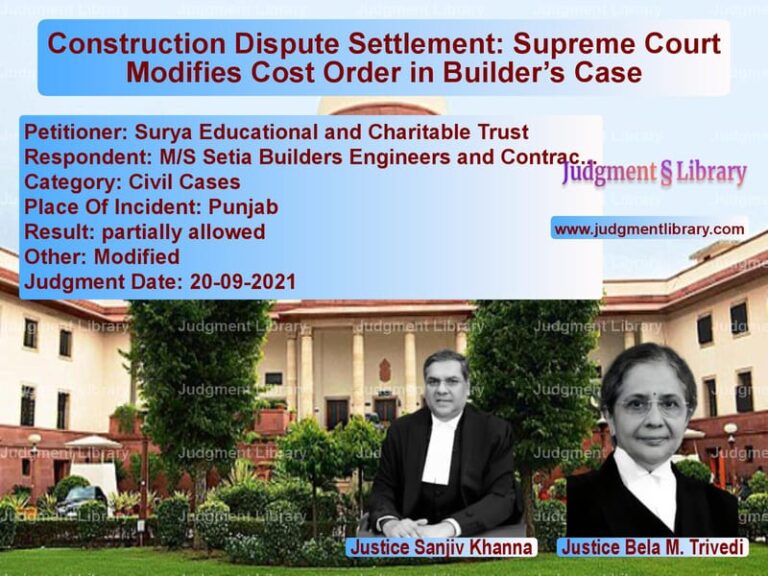Landmark Judgment on Civil Cases: Guardianship Dispute Involving Master Aditya Vikram Kansagra
The legal dispute concerning the guardianship of Master Aditya Vikram Kansagra is a significant case that brings forth crucial aspects of child custody and the application of the Guardianship and Wards Act. The matter before the court was whether the petitioner, who is the natural father of the minor child, should be recognized as the legal guardian under Section 7 of the Guardianship and Wards Act. The respondent contested this claim, leading to an intense legal battle that required a thorough examination of custody laws, parental rights, and the best interests of the child.
Background of the Case
The dispute arose from a situation where the petitioner sought custody of his minor son, arguing that as the biological father, he was entitled to guardianship. The respondent, on the other hand, opposed this petition, asserting that the existing custody arrangement was in the child’s best interest and should not be disturbed. The case required the court to examine several legal provisions, past precedents, and international perspectives on child welfare.
Legal Framework Governing Guardianship
Guardianship laws in India are primarily governed by the Guardianship and Wards Act, 1890 and the Hindu Minority and Guardianship Act, 1956. Under these statutes:
- The natural guardian of a minor is typically the father, unless the court determines otherwise based on the child’s welfare.
- The best interest of the child is paramount, which means that even a biological parent may not be granted custody if it is not in the child’s best interest.
- The court has the authority to appoint a guardian when a minor is under the care of someone else, ensuring the child’s protection and development.
Arguments Presented by the Petitioner
The petitioner, through legal counsel, presented the following arguments:
- The petitioner is the biological father of the minor child and has a natural right to guardianship.
- The respondent has no legal standing to retain custody, as the law prioritizes the child’s relationship with his father.
- The child’s upbringing under the petitioner would be in his best interest, given the financial, emotional, and educational support that he can provide.
- The petitioner was unfairly denied custody due to technical legal formalities that should not override natural parental rights.
Arguments Presented by the Respondent
The respondent opposed the petition and presented the following counterarguments:
- The current guardianship arrangement has provided the child with stability and should not be disrupted.
- The petitioner failed to demonstrate that the child would be better off under his custody.
- It is in the child’s best interest to maintain continuity in his living arrangements, as abrupt changes may cause emotional distress.
- Legal precedents support the notion that custody should be decided based on the child’s welfare rather than the biological relationship alone.
Key Judicial Observations
The court analyzed various precedents, international legal principles, and expert opinions on child psychology before arriving at its decision. The most notable observations were:
“The welfare of the child is of paramount importance. While parental rights are significant, they cannot override what is best for the child.”
The court also stated:
“Custody disputes should be resolved by prioritizing the emotional and psychological needs of the minor rather than legal technicalities.”
Final Judgment
After a thorough review of the case, the court ruled in favor of the petitioner. The key reasons for the decision included:
- The child’s long-term welfare was best served by being under the care of his biological father.
- The petitioner had the financial means and stable living conditions necessary to ensure the child’s growth and education.
- The respondent failed to present compelling evidence to justify the continuation of the current guardianship arrangement.
The court emphasized that its ruling was based on the best interest of the child rather than parental preference. It also directed that the transition of custody should be carried out gradually to ensure the child’s emotional well-being.
Conclusion
This case serves as an important precedent in guardianship disputes. It reaffirms the principle that while biological parents have natural rights over their children, these rights are secondary to the child’s best interests. The ruling underscores the necessity of a careful and nuanced approach in custody cases, balancing legal rights with the emotional and psychological needs of the minor.
Petitioner Name: Natural father of the minor child, Master Aditya Vikram Kansagra.Respondent Name: Unknown.Judgment By: Justice Hemant Gupta.Place Of Incident: Unknown.Judgment Date: 28-10-2020.
Don’t miss out on the full details! Download the complete judgment in PDF format below and gain valuable insights instantly!
Download Judgment: Natural father of th vs Unknown Supreme Court of India Judgment Dated 28-10-2020.pdf
Direct Downlaod Judgment: Direct downlaod this Judgment
See all petitions in Child Custody
See all petitions in Domestic Violence
See all petitions in Alimony and Maintenance
See all petitions in Judgment by Hemant Gupta
See all petitions in allowed
See all petitions in supreme court of India judgments October 2020
See all petitions in 2020 judgments
See all posts in Divorce Cases Category
See all allowed petitions in Divorce Cases Category
See all Dismissed petitions in Divorce Cases Category
See all partially allowed petitions in Divorce Cases Category

